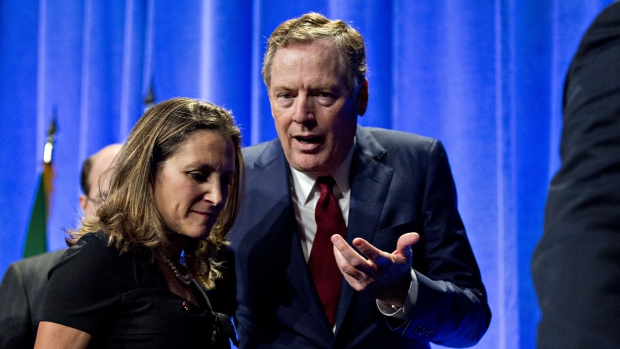Sep 6, 2018
Freeland wraps 'positive' day of NAFTA talks with Lighthizer
, The Canadian Press

WASHINGTON -- Foreign Affairs Minister Chrystia Freeland wrapped up two hours of talks Thursday with her U.S. counterpart in what has become a painstaking march for a deal on the North American Free Trade Agreement.
Freeland's meeting with U.S. trade czar Robert Lighthizer resulted in fresh marching orders for their respective negotiating teams. The minister maintained the same upbeat tone she has held since arriving in Washington this week to reboot talks with the Trump administration.
"We really are confident, as we have been from the outset, that a deal which is good for Canada, good for the United States and good for Mexico is possible," Freeland said, as she departed the office of the U.S. Trade Representative on her way to the Canadian Embassy.
She added that officials "were given some instructions at this meeting and they will continue to work and our negotiations continue."
A block from the White House, Freeland and Lighthizer pored over results from their front-line negotiators who held a long stretch of talks that started Wednesday night and finished in the early morning hours of Thursday.
Canadian negotiators spent the morning huddled in the Canadian Embassy to discuss the outcomes of that meeting, setting the stage for Freeland's face-to-face meeting Thursday with Lighthizer.
Freeland offered few specifics, sticking to her mantra of not wanting to negotiate in public -- an agreement struck with the tough-talking Lighthizer as an act of good faith.
Sources said both sides want a deal, but cautioned there remain disagreements on key issues, including dairy, culture and the Chapter 19 dispute resolution mechanism.
Freeland told reporters at the close of her Wednesday meeting with Lighthizer that she couldn't predict when the two sides would come to an agreement, saying nothing is settled until everything is settled.
On Thursday afternoon, Freeland described the atmosphere as "constructive" and "positive."
Canada and the U.S. need to present an agreed-upon text to the U.S. Congress by Oct. 1 in order to join the deal the Trump administration signed with Mexico.
NAFTA negotiations, now in their 13th month, are key to determining the economic and trade relationship among the three North American countries, with many workers' and industries' prospects hanging in the balance.
President Donald Trump is threatening to move ahead on a deal that excludes Canada, but he also needs a win on trade ahead of midterm elections in November that will test his ability to keep control of Congress.
Trump and Prime Minister Justin Trudeau traded barbs Wednesday, with each saying they were willing to walk away from NAFTA if they don't get what they want.
The goal of this week's talks is to reach a deal by Dec. 1 so Congress can give its approval to a revised three-country NAFTA before Mexico's new president takes office.


